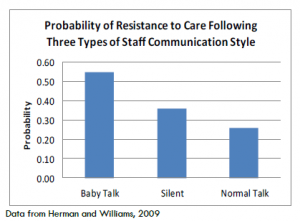 With the responsibility of family caregivers in our country growing every year, it is even more essential to encourage these heroes to take some time for respite so they may continue their mission of providing that loving care that only they can provide. Six out of ten family caregivers juggle everyday life tasks, such as preparing the children for school, managing household responsibilities, and work full-or part-time. In addition, they have the added responsibility of managing medications for their loved-one. Whether it be for a senior with Alzheimer’s or a child with special needs, the required attention can be non-stop; this, and many other important reasons is why Governor Douglas A. Ducey has proclaimed that November is Arizona Family Caregiver Month in Arizona.
With the responsibility of family caregivers in our country growing every year, it is even more essential to encourage these heroes to take some time for respite so they may continue their mission of providing that loving care that only they can provide. Six out of ten family caregivers juggle everyday life tasks, such as preparing the children for school, managing household responsibilities, and work full-or part-time. In addition, they have the added responsibility of managing medications for their loved-one. Whether it be for a senior with Alzheimer’s or a child with special needs, the required attention can be non-stop; this, and many other important reasons is why Governor Douglas A. Ducey has proclaimed that November is Arizona Family Caregiver Month in Arizona.
Communicating with Patients who have Dementia
Resource provided by the Arizona Center of Aging
 Our goal in interacting with people who have dementia is to communicate with them in patient-centered ways that support the effective transmission of information, decrease uncertainty and anxiety, and enhance their self-respect. We should maximize their abilities and allow them to experience successful interaction on their own terms.
Our goal in interacting with people who have dementia is to communicate with them in patient-centered ways that support the effective transmission of information, decrease uncertainty and anxiety, and enhance their self-respect. We should maximize their abilities and allow them to experience successful interaction on their own terms.
It is important to remember that dementias are typically progressive. In the early stage symptoms may be minor, and effective communication with patents in this stage of dementia would differ little from effective communication with any individual. As the disease progresses, however, communication strategies specific to dementia become necessary.
The person inside is still capable of experiencing emotions, and capable of growth and new achievements. Their potential can be maximized by treating them as whole human beings, able to undertake meaningful endeavors.
10 Tips for Communication with Patients who have Dementia
- Simplify Talk – Simplified speech can often be beneficial to people with dementia. In particular, keeping sentence structures simple is helpful.
- Avoid Patronizing Talk – Some aspects of simplified talk, however, may hurt comprehension. “Baby talk” is a style of
talk that includes super short sentences, childish vocabulary (“choo-choo” instead of “train”), pet names (“sweetie”) and baby-ish intonation. There is no evidence that use of such communication is effective. - Repetition – Repetition is helpful if individuals with dementia have trouble grasping an idea or processing a sentence the first time they hear it. Repetition increases the chance they will understand. But, rather than repeating an exchange word for word, phrase the idea in a new way.
- Elaboration – Elaborating on a topic by rephrasing and expressing the same idea using different words can often open up an alternate route to a memory and, therefore, comprehension of a conversation. As memory impairment increases, music, smells, and sensory input can also assist in evoking memories.
- Take Time – Allowing pauses in conversation, being willing to repeat and elaborate, and waiting for a response all signal an openness to the conversational partner. These actions also allow the extra time they need to make connections and generate a response.
- Allow Choice – Even simple choices (“Would you like X or Y?”) grant personhood to the partner, and offer opportunities for control in a life that is often lacking such opportunities.
- Be Concrete – Abstract vocabulary, metaphors, colloquialisms, and plays on words are unlikely to be successful. People with dementia respond to specific, concrete language, particularly language rich in concrete nouns and people’s actual names, rather than pet names or “he” or “she.”.
- Use the Environment – Objects in the environment, such as photographs, food, music, people, or any number of other things can provide stimulation for interaction.
- Use Non-Verbal Strategies – A variety of non-verbal strategies, including physical contact, can help communication.
- Talk to the Person – The opportunity for interaction of any sort is an opportunity to experience a fundamental human connection and is of
value for people with dementia. Negotiating a successful interaction not only enriches the patient’s life, it also makes our work as health care providers more interesting, rewarding, and satisfying.
